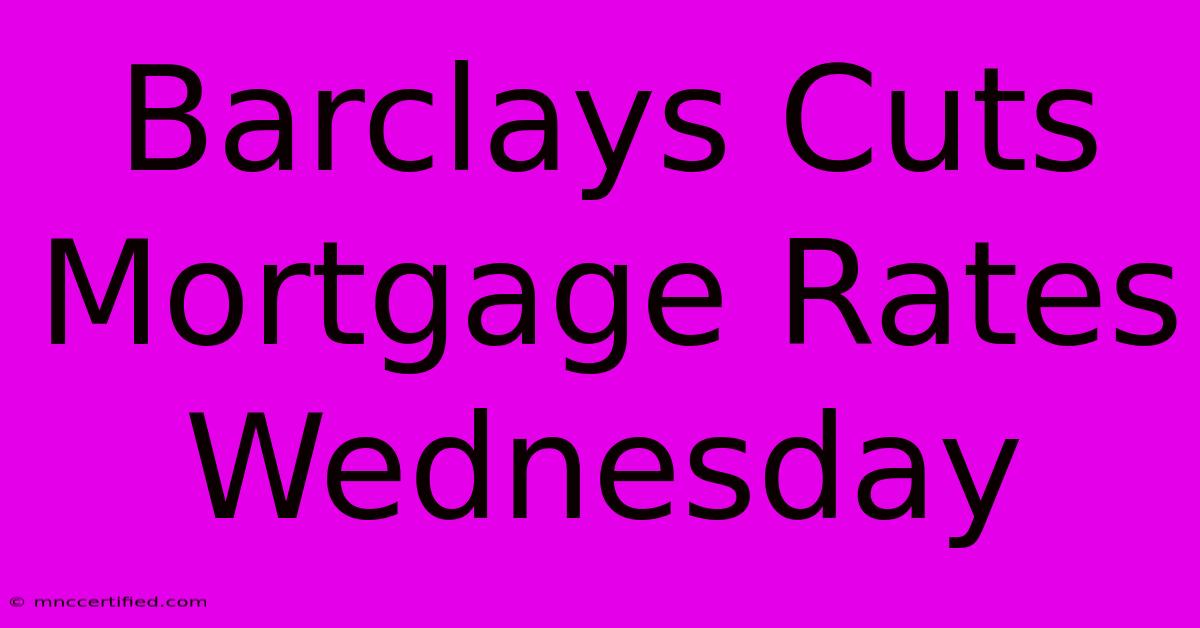Barclays Cuts Mortgage Rates Wednesday

Table of Contents
Barclays Cuts Mortgage Rates Wednesday: What You Need to Know
Barclays' announcement of mortgage rate cuts on Wednesday sent ripples through the UK housing market. This move, while seemingly positive for prospective homebuyers, requires careful consideration. This article delves into the specifics of the cuts, their implications, and what you should do next if you're considering a mortgage.
Understanding Barclays' Mortgage Rate Cuts
On Wednesday, Barclays announced reductions in several of its mortgage rates. While the exact percentage decreases varied depending on the specific mortgage product (e.g., 2-year fixed, 5-year fixed, etc.), the overall effect was a lowering of borrowing costs for many borrowers. This followed a trend of other major lenders adjusting their rates in response to shifting market conditions. This is significant news for anyone looking to purchase a property or remortgage.
Key Details to Consider:
- Specific Rate Changes: It's crucial to check Barclays' official website for the precise details of the rate reductions. The changes are likely to be nuanced, with some products seeing more substantial cuts than others.
- Loan-to-Value (LTV) Ratios: The rate reductions may not apply equally across all LTV ratios. Those with larger deposits might find better deals compared to those with smaller deposits.
- Fees: Always factor in any associated fees, such as arrangement fees or early repayment charges. A lower interest rate might be offset by higher fees, resulting in a less favorable overall deal.
- Eligibility Criteria: Remember that Barclays, like all lenders, has specific eligibility criteria. Ensure you meet these requirements before applying.
Implications of the Rate Cuts
The Barclays mortgage rate cuts have several potential implications for the UK housing market:
- Increased Buyer Demand: Lower interest rates can stimulate demand, potentially leading to increased competition among buyers.
- Price Adjustments: The increased demand might put upward pressure on house prices in certain areas, although other economic factors will also play a significant role.
- Remortgaging Opportunities: Existing homeowners might find it advantageous to remortgage to secure a lower interest rate, potentially saving them money on their monthly payments.
What Should You Do Next?
If you're considering a mortgage with Barclays or are looking to remortgage, here's a step-by-step guide:
- Research: Thoroughly research the specific rates offered by Barclays and compare them to other lenders' offerings. Use online comparison tools and speak to independent financial advisors for unbiased guidance. Don't just focus on the headline rate; examine the full cost of the mortgage.
- Check Your Eligibility: Before making any application, ensure you meet Barclays' eligibility criteria. This often involves checking your credit score and providing evidence of income and employment.
- Seek Professional Advice: Consider consulting a mortgage broker or financial advisor. They can provide personalized guidance and help you find the most suitable mortgage product for your circumstances.
- Compare and Contrast: Don't commit to the first offer you receive. Take your time to compare various options from different lenders to secure the best possible deal.
- Read the Fine Print: Carefully read all the terms and conditions before signing any mortgage agreement. Pay particular attention to fees, early repayment charges, and any other potential costs.
Beyond Barclays: The Broader Market Context
Barclays' move is just one piece of the larger mortgage market puzzle. Keep an eye on announcements from other major lenders. Interest rate fluctuations are influenced by various economic factors, including the Bank of England's base rate and broader inflation trends. Staying informed about these developments is crucial for making informed decisions about your mortgage.
By understanding the specifics of Barclays' rate cuts and taking the necessary steps to research and compare options, you can navigate the mortgage market effectively and make the best decision for your financial future. Remember that seeking professional advice is always a smart move when dealing with such significant financial commitments.

Thank you for visiting our website wich cover about Barclays Cuts Mortgage Rates Wednesday. We hope the information provided has been useful to you. Feel free to contact us if you have any questions or need further assistance. See you next time and dont miss to bookmark.
Featured Posts
-
Walmart Ceo Explains Dei Policy Shift
Nov 27, 2024
-
Zimbabwe Vs Pakistan Pakistan Wins By 10
Nov 27, 2024
-
Mobile Car Detailing Insurance
Nov 27, 2024
-
Brest Vs Barcelona 3 0 Final Score
Nov 27, 2024
-
Ayubs Century Series Levelled
Nov 27, 2024